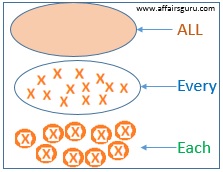Difference Between Each Every and All with Exercises PDF
We can use each (of) and every with singular countable nouns to mean all things or people in a group of two or more (each(of)) or three or more (every).
♦ The programme is on every (or each) weekday morning at 10.00.
♦ Each (or every) ticket costs £35.
We use a singular verb after each (of) and every:
♦ Following the flood, every building in the area needs major repair work. (not …need…)
However, when each follows the noun or pronoun it refers to, the noun and verb are plural.
♦ Every student is tested twice a year. They are each given a hundred questions to do.
Notice that we use they, their and them to refer back to phrases such as ‘each soldier’, ‘every candidate’ etc. which do not indicate a specific gender (male or female). Compare :
♦ Each woman complained that she (or they) had been unfairly treated.
♦ Every candidate said that they thought the interview was too long.
Often we can use every or each (of) with little difference in meaning. However:
We use every
→ with almost, nearly, virtually, etc. that emphasise we are are talking about a group as a whole:
♦ Almost every visitor stopped and stared. (not Almost each visitor…)
→ if we are talking about a large group with an indefinite number of things or people in it:
♦ Before I met Deniel, I thought every small child liked sweets! (rather than….each…)
♦ Every new car now has to be fitted with seat belts. (rather than…each…)
→ with a plural noun when every is followed by a number:
♦ I go to the dentist every six months. (rather than…each six months…)
→ in phrases referring to regular or repeated events such as every other (kilometre), every single (day), every so often, every few (months), every now and again (=occasionally)
→ with abstract uncountable nouns such as chance, confidence, hope, reason, and sympathy to show a positive attitude to what we are saying. Here every means ‘complete’ or ‘total’:
♦ She has every chance of success in her application for the job.
We use each
→ if we are thinking about the individual members of the group. Compare:
♦ We greeted each guest as they entered. (Emphasises that we greeted them individually.)
→ We greeted every guest as they entered. (Means something like ‘all the guests’)
♦ when we are talking about both people or things in a pair:
I only had two suitcases, but each (one) weighed over 20 kilos.
All
When we use all (with plural or uncountable nouns) or every (with singular countable nouns) to talk about things or people in a group they have a similar meaning:
♦ Have you eaten all the apples?
♦ He ate every apple in the house.
However, when we use all or every to talk about time, their meaning is usually different:
♦ John stayed all weekend. (= the whole of the weekend)
♦ John stayed every weekend when he was at university. (=without exception)
| everyone (or everybody) = every person |
|
| anyone (or anybody) = any person at all |
|
Difference between All, Every and Each

| All | Every | Each |
| We use ALL talk about the total number of things considered as a group and not individually. | We use EVERY to talk about things collectively as a group more than individually. | We use EACH to talk about the individual members of a group as separate items. |
| Minimum of three things | Not for two things | For two things or more |
| ALL is used for the entire amount of something. | EVERY is usually for a large number. | EACH is usually for a small number. |
| All + plural noun | Every + Singular Noun | Each + Singular Noun |
| All houses need to have a roof. | Every house on the street looks the same. | Each house on the street has a different number. |
ALL can be used to make a generalization.
|
Can be used for how often something happens.
|
Each of + You/Us/Them
|
Exercises
Complete these sentences with every or each, whichever is correct or more likely. If you can use either every or each, write them both.
- I try to visit my relatives in Spain ……… other year. -> every
- ……… day we went to wok by bicycle. -> Each/Every
- There were tears streaming down ………. side of her face. -> each
- Don has to go overseas on business ……… six weeks or so. -> every
- In a football match, ………. team has eleven players. -> each
- This year I have visited virtually ……… European country. -> every
- From next year, ………… baby in the country will be vaccinated against measles. -> each/every
- The aeroplanes were taking off …….. few minutes. -> every
- I have …….. confidence in his ability to do the job well. -> every
- She pronounced ……… name slowly and carefully as I wrote them down. -> each (‘every’ is also possible, but ‘each’ emphasises that the names are separate and is perhaps more likely here.)
- Rain is likely to reach ……… part of the country by morning. -> every
- I visited him in hospital nearly ……. day. -> every
- We have …….. reason to believe that the operation has been a success. -> every
- When he took his gloves off, I noticed that ……. one had his name written inside. -> each
